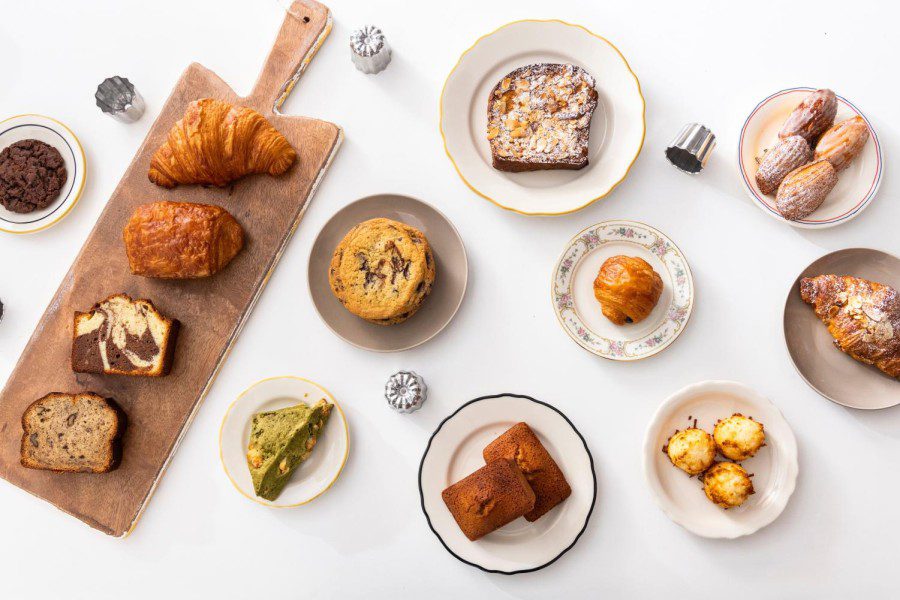Pavé revitalizes the craft of European breadmaking
Pavé’s freshly made bread and quaint interior sets it apart from other cafes and bakeries in New York City.
Pavé is a Korean-owned European-style cafe and bakery located at 20 W. 46th St. (Photo by Evan Sung, courtesy of Pavé)
November 21, 2022
With November well underway, autumn leaves have blanketed the city streets and temperatures have dropped to a winter chill. As New Yorkers adjust to drearier days, they also seem to be on the hunt for the perfect cozy coffee shop to enjoy the end of fall while sipping on a hot drink. Pavé, a cafe and bakery that opened roughly two months ago, is the place to be — a simple, welcoming sanctuary.
Whether you’re picking up your friend from the Port Authority or rushing home through Penn Station, Pavé is open to any passers-by who happen to stumble across its eye-catching blue storefront on West 46th Street. It has a charm missing from the countless Starbucks and Dunkin’ Donuts that litter Midtown. From its exposed brick walls and wooden chairs down to the mismatched doorknobs used as table number stands, Pavé radiates the same feel as a quaint European cafe. Plus, with ample seating, outlets and free wifi, it’s the ideal place to hang out with friends or get some work done.
Despite being relatively new, Pavé already feels like a well-established part of the neighborhood. Upon entering, one is likely to hear a few regular customers chatting away with the employees, international tourists deciding which pastries to take back to their hotel, and college students catching up over some tea and scones. Pavé offers its customers a sense of community, bringing together tourists and native New Yorkers.
But what makes Pavé stand out from the sea of other bakeries and keeps customers returning for more is the quality of their food, which is due in part to their freshly made bread. Jonghun Won, the owner of Pavé, opened this European-style cafe to provide New Yorkers with delicious fresh bread made from simple French baking techniques, a service that he feels is disappearing from the city.
“I never imagined opening a business in New York City, but I believe it’s really hard to find a place using fresh bread for sandwiches anymore like it used to be,” Won said. “I believe local people want that kind of bread, and if there’s a need, why not provide it? ”
Won’s business partner, Jin Ahn, who owns noreetuh, a Hawaiian restaurant in the East Village, emphasized the charm of a handmade craft like bread-making.
“Won had a vision of having that freshly baked bread supplied to New Yorkers, and it’s a dying art,” Ahn said. “I mean, anything that’s handmade or handcrafted — things that we used to take for granted, artisanal — seems to disappear more and more so lately.”
Won’s passion for bread-making stems from his experience working as the executive pastry chef at Jungsik in Seoul and New York, where he met Ahn, and at Balthazar Bakery as a bread mixer. This love for bread-making led him to open La Tabatiere in 2015, located in New Jersey, which offers a large variety of bread, pastries and cakes for pickup and delivery.
Coming from South Korea, Won said that there are some Korean influences present in his pastries, like the green tea scone on the menu at Pavé. Despite these influences, Won insists that Pavé isn’t a Korean cafe — instead, he keeps things simple to make good bread. With Pavé, as with La Tabatiere, Won’s main focus when baking is what he calls the “simple, classic things,” like croissants and baguettes.
“Maybe there will be a stage, once I reach a certain point, [where I can] probably include some variation — introduce more Korean elements to the food,” Won said. “But for now, I want to focus more on the classic things.”
Pavé offers many of the classic items found in French cafes, including a generous selection of sandwiches, salads, baked goods and drinks. Some of their most popular items are the fresh and flavorful burrata salad and the brioche with passionfruit filling. Like the green tea scone, the brioche is both light and not overwhelmingly sweet — which my Korean mom says is the greatest compliment a pastry can get.
Ahn recalls having a conversation with Won before he opened his first bakery in New Jersey about the European aspects of his baking. He asked him why he didn’t choose to include more Korean or broader Asian elements into his craft.
“I said, ‘Hey, why don’t you put in some Asian accents or bring your heritage to life,'” Ahn said. “But he said ‘Well, you know, that’s not really what I want to do. I like baguettes, I like classic French bread, I like bread that you get from Germany, I like this French butter, I like the flour that you find in European countries, and when you go there you get these classic things and classic things are made with simple ingredients and are well executed, that’s what I want to do.’”
With time, Won said he hopes to incorporate more pastries and baked goods into Pavé’s menu, like ham-and-egg croissants, one of the most popular items in his bakery in New Jersey. For now, Pavé’s main goal is to get the word out to more people. Ahn says Pavé is currently on some delivery sites, like Sharebite and Grubhub, but are hoping to expand to Uber Eats and DoorDash.
“Survival is number one,” Ahn said. “Having the diners come back to us over and over because they find this to be something beautiful, something worthy and something worthy to support.”
Contact Jasmine Venet at [email protected].


























































































































































